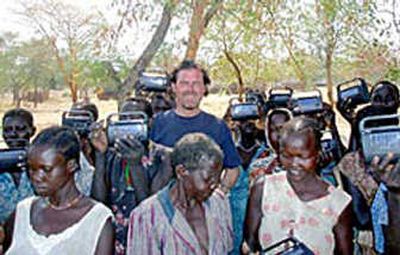U.S. diplomat slain in Sudan capital

KHARTOUM, Sudan – An American diplomat was shot and killed early Tuesday by gunmen in a passing car who cut him off as he was being driven home in Sudan’s capital. Sudanese officials insisted it was not a terrorist attack but the U.S. Embassy said it was too soon to determine the motive.
The diplomat’s Sudanese driver was also killed in the shooting.
The Sudanese government often drums up anti-Western sentiment in the media. But attacks on foreigners are rare in Khartoum, where an American diplomat was last killed in 1973.
John Granville, 33, was an official for the U.S. Agency for International Development, USAID and Granville’s family said. He was working to implement a 2005 peace agreement between Sudan’s north and south that ended more than two decades of civil war, USAID said.
Granville was being driven home about 4 a.m. when another vehicle cut off his car and opened fire before fleeing, the Sudanese Interior Ministry said.
The diplomat’s driver, Abdel-Rahman Abbas, was killed. Granville initially survived the attack with five gunshot wounds to the hand, shoulder and stomach. He died after surgery, said Walter Braunohler, the public affairs officer at the U.S. Embassy in Khartoum.
USAID Administrator Henrietta H. Fore said the two men killed “were serving the common interests of the U.S. and the Sudan in bringing peace and stability to a country that has long been wracked by violence and conflict.”
USAID did not release other information about the shootings or the victims.
Granville’s family in Buffalo, N.Y., said the diplomat was committed to his work in Africa.
“John’s life was a celebration of love, hope and peace,” a family statement said. “He will be missed by many people throughout the world whose lives were touched and made better because of his care.”
Buffalo-area congressman Rep. Brian Higgins said Granville knew his work put his life in danger.
“He told his mom several times … that it’s dangerous, what he’s doing, but he wouldn’t want to be doing anything else,” said Higgins, who spoke with Granville’s mother, Jane Granville, after her son’s death.
Sudan’s Foreign Ministry said the incident was “isolated and has no political or ideological connotations” and pledged to bring the culprits to justice, according to state news agency SUNA.
The Sudan Media Center, which has close links to the government, cited an unidentified government official as saying the attack was criminally motivated and that there was “no grain of suspicion of an organized terrorist action.”
However Braunohler, the embassy spokesman, said it was “too early to tell” whether the attack was terror-related. Because of an ongoing investigation, he said he could not comment on any of the details provided by the Sudanese.
The shooting came a day after a joint U.N.-African peacekeeping force took over control in the western Sudanese region of Darfur, where more than 200,000 have died in a conflict that began in 2003. Al-Qaida has called for a “jihad” or holy war, in Sudan against the peacekeepers.
But al-Qaida has shown little overt presence in the country in recent years since the Sudanese government threw out Osama bin Laden in the late 1990s.
Al-Qaida was blamed in the 2002 assassination of an American USAID officer, Laurence Foley, who was gunned down outside his home in Amman, Jordan.
Humanitarian aid workers have come under increasing attack in Darfur by the region’s multiple armed groups, but such attacks have not been known to take place in Khartoum. In any case, Granville’s work appeared to be focused on providing aid for Sudan’s south, well away from Darfur.
Granville’s work included bringing radios to residents of south Sudan to maximize USAID’s broadcasting initiatives in the region, according to the organization’s Web site, which posted pictures of Granville surrounded by some of those who received radios.
Though crime in Khartoum is lower than other major African cities such as Nairobi, Kenya, anti-American sentiment runs high and officials have lately stepped up verbal attacks on U.S. policies toward Sudan.
The U.S. government has been a vocal critic of the Arab-dominated government’s attacks on ethnic Africans in Darfur.
A government-allied militia known as the janjaweed has been accused of the bulk of atrocities in the Darfur conflict, including rapes and razing of ethnic African villages.
In the latest step to pressure Sudan’s government on Darfur, President Bush signed legislation to allow states and local governments to cut investment ties with Sudan because of the Darfur violence.
Granville is the first U.S. diplomat to be killed in Sudan since the 1973 assassination of U.S. Ambassador Cleo Noel, slain along with senior embassy officer George Curtis Moore by the Palestinian Black September militant group.